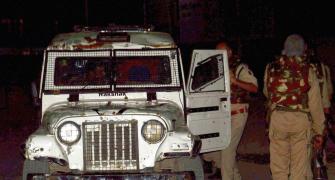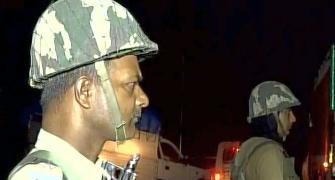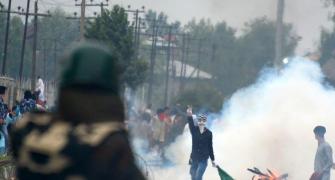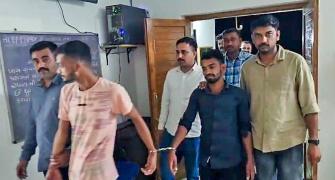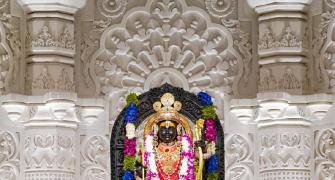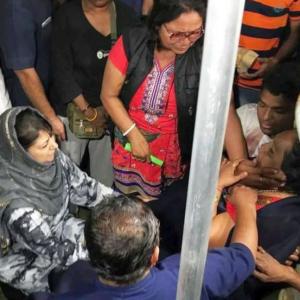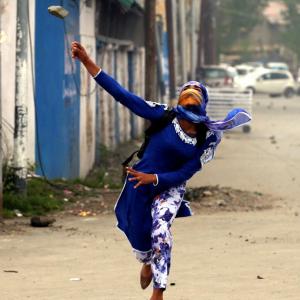'There is genuine shock amongst Kashmiris.'
'The attack runs counter to the culture of Kashmir and the grain of the Kashmiri character.'
'The spirit of religious faith in Kashmir is inclusive.'
'An ordinary Kashmiri can be a political fundamentalist, but never a religious fundamentalist,' says Mohammad Sayeed Malik, the veteran commentator on Kashmir affairs.
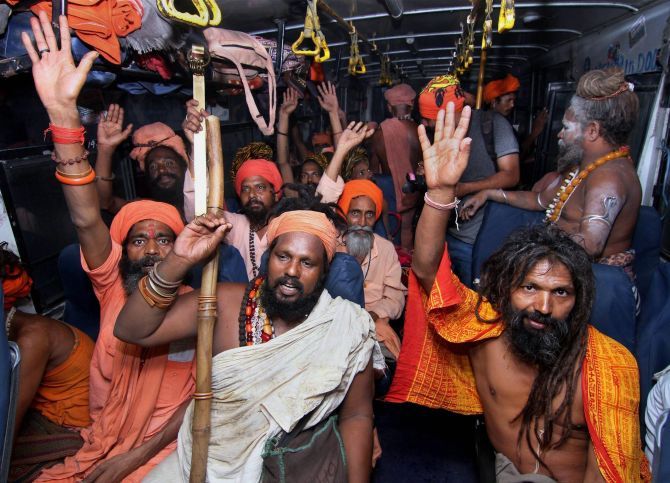
The attack on the pilgrims is a great tragedy.
It runs counter to the culture of Kashmir, the grain of the Kashmiri character.
In spite of all the odds -- there is no denying that there have not been distortions or aberrations -- but overall the core of this culture has remained intact, even when under great strain.
This is under attack. An overwhelming -- 90 per cent to 95 per cent of Kashmiris -- are very upset with this (attack on the Amarnath Yatra).
There is genuine shock amongst Kashmiris about what happened.
Were security norms not adhered to by the bus?
The most vulnerable period on the ground in Kashmir is between 7 pm and 9 pm. Before that, there is full deployment (of the security forces.
Between 7 pm and 9 pm, most police and paramilitary forces are withdrawn to their bases. That is the vulnerable time when the militants strike.
Amarnath Yatra buses are supposed to be at their home (the base for the night) by 7 pm whether in Baltal, Pahalgam or Jammu, so that the pilgrims are not exposed to any threat.
I will not say that the attack happened because the bus straggled behind, but it not being part of the convoy contributed to it being vulnerable to attack.
On local participation in the Amarnath Yatra:
Locals -- porters -- carry old pilgrims on their shoulders.
Pilgrims buy food, stay in Kashmiri hotels and interact with Kashmiris.
If there was an element of terrorism or militancy that threatened the yatra, the locals would not go there. But they go in flocks.
If local militants were against the yatra, local Kashmiris would not venture there. This means that there is no such threat.
Some elements within the militancy may not look at it that way, but by and large there is local participation in huge numbers.
On the shrine being located in south Kashmir, the current hotbed of militancy:
This incident happened in south Kashmir which is in the grip of acute militancy.
South Kashmir was the political stronghold of the PDP (the Peoples Democratic Party, which rules Jammu and Kashmir in alliance with the Bharatiya Janata Party).
The PDP was seen as a sort of buffer between the state and the rest of the country, but that buffer has been rendered hollow because the PDP-BJP agenda of alliance -- which included dialogue -- has not been undertaken.
Three years down the line, no one talks of the assurances that were given.
There is a political vacuum on the ground that creates space for the militants.
Estrangement, alienation is fuelling the situation and there is total lack of political initiative and indifference to tackle the situation.
Its impact on Kashmir and beyond?
One more incident has taken place, but its implications go beyond.
In the prevailing atmosphere of radicalisation, polarisation in the country, it can be an aggravating factor because of the sentiments attached to the religious pilgrimage.
Unfortunately, the Amarnath Yatra has been polarised for the past two decades as a counter reaction to militancy.
Earlier, it used to be a very ordinary affair, in the sense everybody was involved in it as an annual routine of the socio-culture life of Kashmir.
I have covered it from the 1950s and 1960s and never have I found animosity from locals towards the pilgrims.
When I was a child I remember how it started from Lal Chowk in the heart of Srinagar.
The holy mace of Lord Shiva was taken in a procession.
We children, Hindus and Muslims, would line up to see the celebration as it made its way.
En route it used to stop at a couple of temples and reach the cave shrine on Purnima.
The yatra always started from Lal Chowk. The present custodian of the holy mace is Acharya Deependra Giri.
Later, that changed and it became a yardstick for measuring the behaviour of the local Kashmiri.
Few elements in the yatra started shouting provocative slogans, not always religious.
There are some elements who made it look if they were coming to conquer Kashmir more than going on a religious pilgrimage.
Some elements have tried to give it an ugly edge, but the yatra is a part of our culture.
On another attack in the series of attacks in Kashmir:
The spirit of religious faith in Kashmir is inclusive.
There is an inclusiveness of Islam in Kashmir.
An ordinary Kashmiri can be a political fundamentalist, but he can never be a religious fundamentalist.
I have seen in political fights, they have burned mosques, not temples.
The Jama Masjid was set on fire in 1965 because of trouble between Sheikh Abdullah and Mirwaiz's family.
The aam Kashmiri does not like this sort of thing -- there are 10 per cent to 20per cent who may not think like this, like in any other society.
People are spiritual here.
Islam in Kashmiri has a different characteristic. Some of its beliefs are in conflict with radical Islam.
Implications of the attack outside Kashmir?
Kashmiris outside will be the target.
People who want to provoke this will light a fire.
I fear most for Kashmiri students.
Television channels have also contributed to vitiating the atmosphere against Kashmiri Muslims.
This can lead to a spark where emotions will run high and people would want to exploit the situation.
The agenda of alliance included confidence building measures -- all under the Constitution and existing political parameters -- to enter into a dialogue with your own people.
But they don't care and want the military to take care. They should start with honouring that commitment.
There is no effort from the government's end and that is the end that matters.
Does the attack mean a red line has been breached in Kashmir?
We need to determine who was involved (in the terror attack) and who carried it out.
If it involves foreign terrorists, it is part of their old game.
Even if local militants are found to be involved, I will see it as an aberration. Not as a pattern.
Only investigations will reveal who is involved, so I will hold my view.
Mohammad Sayeed Malik, the veteran commentator on Kashmir affairs, spoke to Rediff.com's Archana Masih from Srinagar.
IMAGE: Sadhus during the journey. Photograph: PTI Photo

